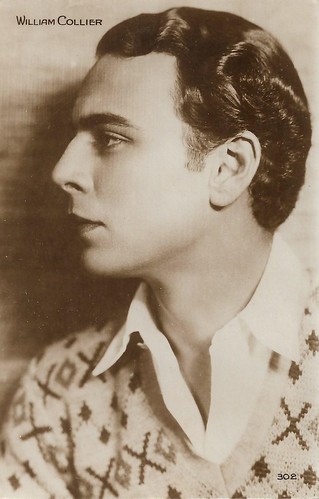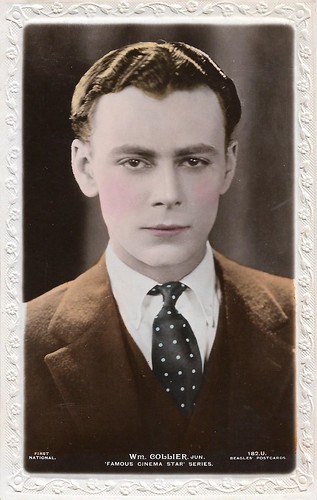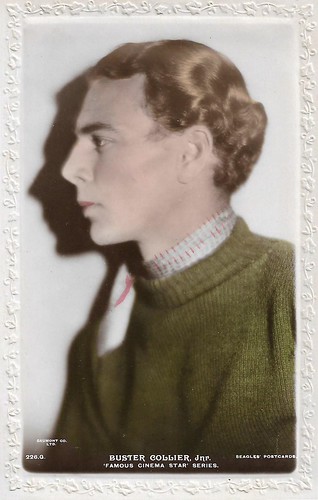
Danish postcard by Alex Vincent's Kunstforlag, Kobenhavn (Copenhagen), no. 85. Photo: William Collier Jr. in The Wanderer (Raoul Walsh, 1925), an adaptation of the Biblical story of the Prodigal Son.

British postcard in the Picturegoer Series, London, no. 305A.

French postcard by Cinémagazine-Edition, Paris, no. 302.
An actor in youthful leading roles
Charles F. Gall Junior was born in in 1902 in New York City as the son of the theatre actress Paula Marr and the theatre manager Charles F. Gall.
He appeared on stage for the first time at the age of seven. After his parents divorced, his mother married again: to the well-known actor William Collier Senior (1864-1944). He adopted Charles Gall Jr. and renamed his stepson William Collier Junior in 1914.
Having already gained some experience on the stage, Collier made his first silent film, The Bugle Call, in 1916 at the age of 14. This was the beginning of a very successful career as a silent film actor in Hollywood.
Especially in the 1920s, Collier achieved temporary popularity as an actor in youthful leading roles, in particular in Raoul Walsh's epic The Wanderer (1925), based on the Biblical tale of the prodigal son, who longs for the city and squanders his inheritance on gambling and on a seductive priestess of Ishtar, Tisha (Greta Nissen). She kicks him out when his money has gone, but God punishes both her and the city. The young man goes from riches to rags but is eventually welcomed back by his father.
Sadly, only an incomplete of the film survives. On the whole, most of Collier's silent films are lost today. Collier was a popular male lead in the 1920s, or antagonist to the male lead, opposite female stars such as Olive Thomas, Louise Lorraine, Madge Bellamy, Betty Compson, and in particular Irene Rich, Shirley Mason and Greta Nissen, with whom he did several films.

Italian postcard by Casa Editrice Ballerini & Fratini, Firenze (Florence), no. 458. Photo: SAI Films Paramount, Roma. Greta Nissen and William Collier in The Wanderer (Raoul Walsh, 1925), released in Italy as Il figliuol prodigo [The prodigal son]. Collection: Didier Hanson.

British postcard in the Famous Cinema Film Star series by Beagles, no. 180.U. Photo: First National.

British postcard in the Famous Cinema Film Star series by Beagles, no. 226.G. Photo: Gaumont Co. Ltd.
Gangster classic
William Collier Jr. mastered the leap into the talkies at the end of the 1920s without major problems. In 1931 he played his most famous film roles today.
In Mervyn LeRoy's gangster classic Little Caesar (1931) he played the gangster Tony Passa alongside Edward G. Robinson, and in the Western epic Cimarron (1931) - which won the Oscar for Best Picture of the Year - he took on an important supporting role as a bandit.
Also in 1931, he played the young sympathiser in King Vidor's socially critical drama Street Scene. Soon after, however, his popularity waned and he retired from acting in 1935 after the film The People's Enemy by Crane Wilbur. He had appeared in a total of 89 films over a 19-year period.
Collier then worked as a producer of films and plays, first in the United States, and then in England from 1937 to the late 1940s. He returned to the USA in the 1950s and was responsible for several television series as a producer.
William Collier was married to Marie Stevens from 1934 until her death in 1981; they had one child. He died of arteriosclerosis in San Francisco in 1987, a week before his 85th birthday. He has a star on the Hollywood Walk of Fame for his film work.

Belgian postcard. by Ed. Weekblad Cinéma, Antwerp.

American Arcade card by Exhibit Supply Co., Chicago, Ill. Photo: Paramount Pictures. Betty Compson, Lionel Belmore and William Collier Jr in Eve's Secrets (Clarence G. Badger, 1925).

German postcard by Ross Verlag, Berlin, no. 1837/1, 1927-1928. Photo: Fanamet.
Sources: Wikipedia (German and English) and IMDb.
This comment has been removed by a blog administrator.
ReplyDelete